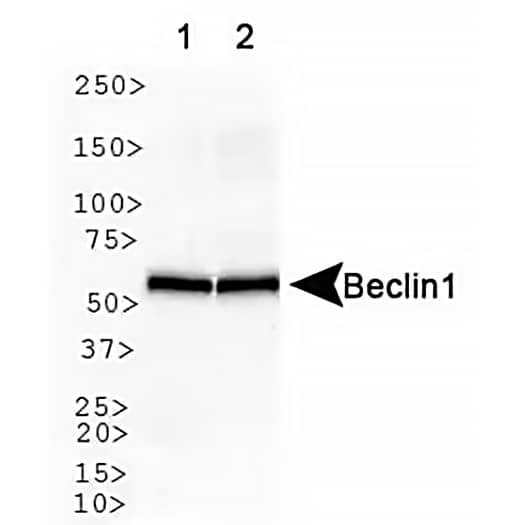The Beclin 1 protein is a central regulator of autophagy in mammalian cells. Autophagy is an essential process used to maintain cellular homeostasis by degrading and recycling cellular components such as damaged or worn out organelles and macromolecules. Autophagy is also activated in response to cellular stresses such as nutrient starvation or intracellular pathogens and can protect the cell from programmed cell death. Beclin 1 acts during the initiation stage of autophagy by forming the isolation membrane, a double-membrane structure that engulfs cytoplasmic material to form the autophagosome. Beclin 1 contains three structural domains: a BH-3 only domain, a central coiled-coil domain (CCD), and an evolutionarily conserved domain (ECD). These domains interact with a network of proteins involved in the regulation of autophagy. Under normal conditions the anti-apoptotic protein Bcl-2 inhibits autophagy by interacting with Beclin 1 through its BH-3 only domain. Disruption of this interaction allows Beclin 1 to bind with Vps34 and Vps15 through its CCD and ECD domains forming the core complex necessary for the induction and assembly of the autophagosome. Beclin 1 is also an important tumor suppressor whose expression is reduced in many cancer types including breast, ovarian, and prostate. The reduced levels of Beclin 1 are thought to inhibit autophagy and prevent the turnover of damaged mitochondria which leads to production of reactive oxygen species and genotoxic stress.

Western Blot: Beclin 1 Antibody (Catalog # NB500-249) - WB analysis of Beclin 1. Lane 1 human brain and Lane 2 mouse brain.
While examining protein aggregates involved in neurodegenerative disease the Cuervo group noted differences in autophagosome initiation for different substrates (1). They used the Beclin 1 antibody to visualize the formation of the autophagosome nucleation complex on various types of protein aggregates to try and understand how protein modifications can alter autophagosome formation. The Siddiqui & Malathi from the University of Toledo (USA) used the Beclin 1 antibody in immunoprecipitation assay to measure the dissociation of Beclin 1 and its inhibitor Bcl-2 (2). This allowed them to monitor the induction of autophagy in response to viral infection and show the importance of Beclin 1 in the turnover of damaged organelles. Researchers from UCLA Medical School relied on the Beclin 1 antibody in immunoblotting experiments to confirm the knockdown of Beclin 1 levels and the subsequent inhibition of autophagy in multiple myeloma cells (3). Their data identified increased levels of autophagy as a pro-survival mechanism in multiple myeloma cells and offered insight into future drug combination therapies. The LaFerla group used the Beclin 1 antibody to examine the role of autophagy in Alzheimer's disease (4). They showed deletion or knockdown of presenilin results in a decrease in Beclin 1 levels. The Edelstein group from the University of Colorado at Denver used the Beclin 1 antibody to show induction of hypoxia-inducible factor 1-alpha (HIF-1α) leads to increased Beclin 1 levels and an increase in autophagosomes in polycystic kidney disease (5). This result was the first demonstration of autophagy in polycystic kidney disease.
Bio-Techne offers Beclin 1 reagents for your research needs including:
PMIDS
- 23212369
- 23109342
- 19509276
- 21414900
- 21270095